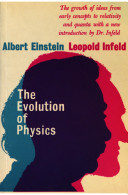Science Manipulates Language to Make it More Precise
Let us consider two spheres moving in different di- rections on a smooth table. So as to have a definite picture, we may assume the two directions perpendicu- lar to each other. Since there are no external forces acting, the motions are perfectly uniform. Suppose, further, that the speeds are equal, that is, both cover the same distance in the same interval of time. But is it correct to say that the two spheres have the same velocity? The answer can be yes or no ! If the speedo- meters of two cars both show forty miles per hour, it is usual to say that they have the same speed or velocity, no matter in which direction they are travelling. But science must create its own language, its own con- cepts, for its own use. Scientific concepts often begin with those used in ordinary language for the affairs, of everyday life, but they develop quite differently. They are transformed and lose the ambiguity associ- ated with them in ordinary language, gaining in rigor- ousness so that they may be applied to scientific thought.
From the physicist's point of view it is advantageous to say that the velocities of the two spheres moving in different directions are different. Although purely a matter of convention, it is more convenient to say that four cars travelling away from the same traffic round- about on different roads do not have the same velocity even though the speeds, as registered on the speedometers, are all forty miles per hour. This differentiation between speed and velocity illustrates how physics, starting with a concept used in everyday life, changes it in a way which proves fruitful in the further development of science.
Notes:
The example is "velocity" which in common parlance is the same as "speed," but in science it means "speed and direction."
Folksonomies: science language semantics lexicon
Taxonomies:
/science (0.591567)
/science/physics (0.531960)
/technology and computing/mp3 and midi (0.504832)
Keywords:
everyday life (0.968888 (positive:0.228971)), ordinary language (0.935038 (negative:-0.343917)), velocity (0.901598 (negative:-0.222600)), common parlance (0.794509 (neutral:0.000000)), smooth table (0.763181 (positive:0.690028)), Precise The example (0.761149 (positive:0.283244)), external forces (0.732031 (negative:-0.236003)), different di (0.730511 (positive:0.253795)), ambiguity associ (0.716140 (negative:-0.484154)), Scientific concepts (0.684885 (positive:0.380945)), spheres (0.684608 (positive:0.307093)), different directions (0.640070 (positive:0.377126)), different roads (0.633959 (negative:-0.213090)), science (0.633388 (positive:0.553743)), speed (0.633265 (positive:0.135974)), speeds (0.502865 (negative:-0.201311)), matter (0.476671 (neutral:0.000000)), miles (0.454455 (negative:-0.499053)), cars (0.454265 (negative:-0.363296)), lar (0.417782 (neutral:0.000000)), definite (0.417254 (positive:0.579288)), speedo (0.415454 (neutral:0.000000)), motions (0.404251 (positive:0.540096)), rigor (0.402625 (positive:0.276971)), velocities (0.401996 (neutral:0.000000)), speedometers (0.398371 (neutral:0.000000)), interval (0.397683 (positive:0.450026)), differentiation (0.387906 (negative:-0.334035)), physicist (0.384335 (positive:0.302944)), picture (0.383272 (neutral:0.000000))
Entities:
physicist:JobTitle (0.706169 (positive:0.302944)), cepts:Person (0.683304 (neutral:0.000000)), forty miles per hour:Quantity (0.683304 (neutral:0.000000))
Concepts:
Speed (0.955944): dbpedia | freebase | opencyc
Physics (0.821467): dbpedia | freebase | opencyc
Velocity (0.807191): dbpedia | freebase
Scalar (0.766042): dbpedia | freebase | yago
Kinematics (0.679990): dbpedia | freebase
Miles per hour (0.606637): dbpedia | freebase
Mass (0.534743): dbpedia | freebase | opencyc
Debut albums (0.530947): dbpedia

Triples
 Scientific Semantics Versus Public Semantics
Scientific Semantics Versus Public Semantics
Science Manipulates Language to Make it More Precise > Example/Illustration > The Difference in How the Public and Scientists Use "Theory"Science works from existing language and makes it more specific. This causes problems with words like "velocity" and "theory" when communicating with muggles.




